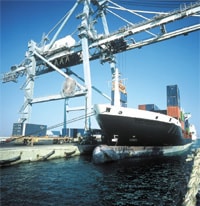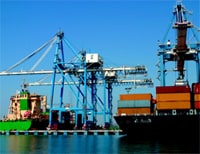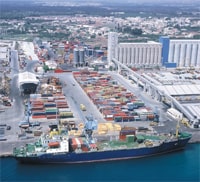Country Report: Building Bridges
As its economy continues to grow, Cyprus is hoping to take advantage of its strategic position between Europe and the burgeoning markets of the Middle East and Africa.

|
The failure to unite the divided island was a disappointment to everyone. Weve always wanted a solution to the problem, but we needed something more than the Annan plan offered, says Dennis Droushiotis, trade commissioner for the country in New York. He notes that political parties within the Greek Cypriot National Council recently put together a response to the Annan plan to try to find a way forward.
Meanwhile, the north of Cyprus, though growing, remains substantially poorer than the south and reliant on handouts from Turkey, the only country that recognizes itand the source of its 30,000 troops. Recent court cases bought by Greek Cypriots in the south over property owned by them in the north before 1974and subsequently sold to British holidaymakersindicate the scale of the task to be achieved for reconciliation to occur.
Despite the failure to reconcile the conflicts of the past, the south of Cyprus is experiencing an economic recovery. Last year the economy grew by about 3.5%, and this year we are expecting up to 4%, says Sofronis Eteocleous, head of economic research and planning at Laiki Group, owner of Cyprus Popular Bank. Meanwhile, inflation is low and fairly steady. Last year it dropped to 2.3% from 4.1%, but this year we expect a slight acceleration because of oil prices.
|
Diversifying the Economy |
|||
Tourism has long been the mainstay of the Cypriot economy, and services (of which most is tourism) account for 72% of GDP, according to Droushiotis. Tourism remains the engine in terms of foreign currency, he says. But the failure of visitor numbers to recover to pre-9/11 levels has focused attention on other areas of the economy. We dont have our eggs in one basket, says Droushiotis. There are over 50,000 corporations in Cyprus.
Despite an increase in the corporate tax rate from 4.25% to 10%, which was a condition of entry to the EU, Cyprus remains an attractive location for tax planning. It still has one of the lowest corporate tax rates in Europe and has tax treaties with 34 countries, with a further 31 under negotiation. According to Remko van Roekel, Cyprus analyst at Citco Corporate & Trust, the new tax regime is actually more favorable to companies in terms of exemptions. There hasnt been much lost, in all honesty, he explains, and now its got the seal of approval from the OECD and the EU. Furthermore, he notes that the changes that Cyprus made before accession have cleaned up the economy. There were concerns about some of the Russian money coming into Cyprus, he adds. It wasnt great for the image of the country. Other services hope to benefit from Cyprus location as a bridge between Europe and the growing economies of the Middle East and North Africa. The country has had free trade zoneswhere companies bring in shipments intended for neighboring markets and divide them up into country deliveriessince 1977, and use of them is increasing by such companies as IBM and Este Lauder. Last year Cyprus generated $400 million in re-exports. Meanwhile, the government is also trying to encourage technology-based companies, especially in IT services. It has set up four $250,000 venture capital funds to develop companies and also signed agreements with EU countries and the State University of New York and Harvard University Research Institute on Public Health to bring a greater knowledge base to its economy. The geographical positioning of the country is also working in Cyprus favor in the technology market, says Droushiotis. He notes that US firm Amdocs recently hired 45 IT professionals from India to work on software in Cyprus because communications with the US are better in Cyprus than in India, and the working environment is more stable and developed. Despite the countrys enthusiasm for joining the EU, the benefits of membership are perhaps less immediate for Cyprus than for the other nine countries that joined in May 2004. As the local press repeatedly noted, the country was the richest of the 10 new states. Indeed, it is expected that within a few years, Cyprus will become a net contributor to the EU budget. In the short term, however, Cyprus will benefit from agricultural modernization programs in areas such as dairy and wine production, the latter presenting potentially huge growth opportunities for the sun-drenched country. In addition, being a member of the EU gives Cyprus much more clout when it comes to determining quotas and trading with the US. |
Preparing to Join the Euro

|
Chief among these is lowering the countrys deficit, which was 6.3% in 2003 and 4.2% last year. The target is to hit the eurozone entry level of 3% by 2006. The government has had a tax amnesty from September 2004 to February this year, and that will affect revenues for both this and next year and should allow the government to hit its target, says Eteocleous. In addition, the government has resolved not to increase civil servant wages for 2004 and 2005 and has been successful in that. However, it has met resistance in trying to extend the pensionable age of civil servants from 60 to 63.
As van Roekel notes, the government is prepared to do almost anything to fulfill the criteria for eurozone entry. They would put up VAT [sales tax], but I think they would draw the line at increasing corporate tax, he says. Indeed, despite expecting a slight pick-up in inflation rates, the central bank recently reduced interest rates from 5.5% to 5.25%. The aim was to send a message regarding convergence, says Eteocleous. Our inflation is basically generated outside the island, so theres no danger from this move. And Cyprus really wants to be ready for the euro.
Laurence Neville




